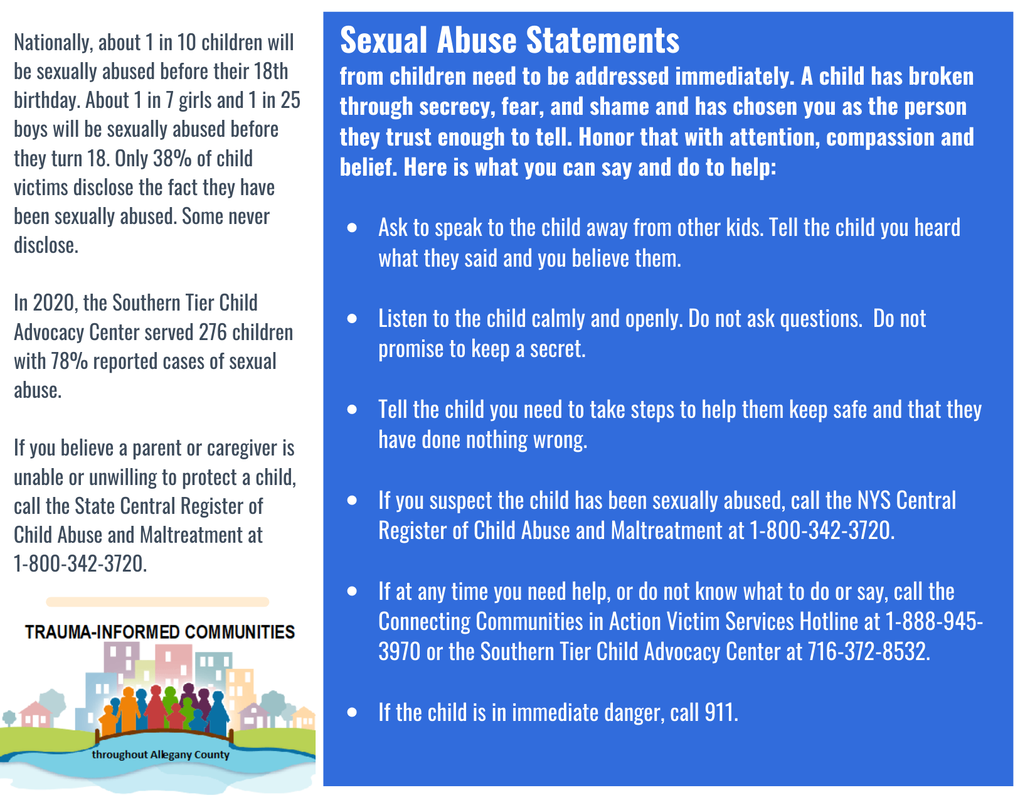- Home
- Trauma-Informed Education
- Trauma Overview
-
#onecaringadult
- #Onecaringadult Allegany County App
- #onecaringadult- Academic Stress
- #onecaringadult- Alcohol and Other Drugs
- #onecaringadult- Bullying
- #onecaringadult- LGBTQ+
- #onecaringadult- Childhood Neglect
- #onecaringadult- E-Cigarettes and Vaping
- #onecaringadult- Eating Disorders
- #onecaringadult- Mental Health
- #onecaringadult- Online Sexual Exploitation
- #onecaringadult- Non-Suicidal Self-Injury
- #onecaringadult- Sexual Abuse
- #onecaringadult- Sexually Transmitted Infections
- #onecaringadult- Suicide Prevention
- #onecaringadult- Teen Dating Violence
- #onecaringadult- Teen Pregnancy
- #onecaringadult- Toxic Stress
- #onecaringadult- Vaping & E-Cigarettes
- #onecaringfriend
- Trauma-Informed Resources
|
One in 10 children will be the victim of sexual abuse before their 18th birthday. There is an estimated 42 million adult survivors of sexual abuse living in the United States today. Child sexual abuse takes many forms, and they aren’t just physical. At its core, sexual abuse is any sexual act between an adult and a minor, or between two minors when one exerts power over the other. It also includes non-contact acts such as exhibitionism, exposure to pornography, and voyeurism.
Child sexual abuse can occur anywhere. It happens in places like homes, neighborhoods, schools, and youth sports environments, but it also occurs online, such as child pornography or communicating in a sexual manner by phone or internet. |
|
Source: Darkness to Light
WHAT YOU NEED TO KNOW ABOUT CHILD SEXUAL ABUSE
|
Recognize Child Sexual Abuse
The following physical, behavioral, and emotional signs are not meant to serve as an exhaustive list of the ways children experiencing sexual abuse may act, feel, or work through their trauma. A child’s response is unique to them as an individual and may or may not include the common signs mentioned.
Physical Signs
Behavioral signs
Emotional Signs
|
Learn More About Child Sexual Abuse
|
|
Consequences of Child Sexual Abuse
Experiencing child sexual abuse is an adverse childhood experience (ACE) that can affect how a person thinks, acts, and feels over a lifetime, resulting in short- and long-term physical and mental/emotional health consequences.
Physical health consequences
Examples of physical health consequences include:
Mental Health consequences
Examples of mental health consequences include:
Behavioral Consequences
Examples of behavioral consequences include:
Revictimization
Another outcome commonly associated with child sexual abuse is an increased risk of re-victimization throughout a person’s life. For example, recent studies have found:
Source: Center for Disease Control
|
Helpful Links
|
- Home
- Trauma-Informed Education
- Trauma Overview
-
#onecaringadult
- #Onecaringadult Allegany County App
- #onecaringadult- Academic Stress
- #onecaringadult- Alcohol and Other Drugs
- #onecaringadult- Bullying
- #onecaringadult- LGBTQ+
- #onecaringadult- Childhood Neglect
- #onecaringadult- E-Cigarettes and Vaping
- #onecaringadult- Eating Disorders
- #onecaringadult- Mental Health
- #onecaringadult- Online Sexual Exploitation
- #onecaringadult- Non-Suicidal Self-Injury
- #onecaringadult- Sexual Abuse
- #onecaringadult- Sexually Transmitted Infections
- #onecaringadult- Suicide Prevention
- #onecaringadult- Teen Dating Violence
- #onecaringadult- Teen Pregnancy
- #onecaringadult- Toxic Stress
- #onecaringadult- Vaping & E-Cigarettes
- #onecaringfriend
- Trauma-Informed Resources
